Kenya coffee processing method Introduction Fine coffee double washing What flavor
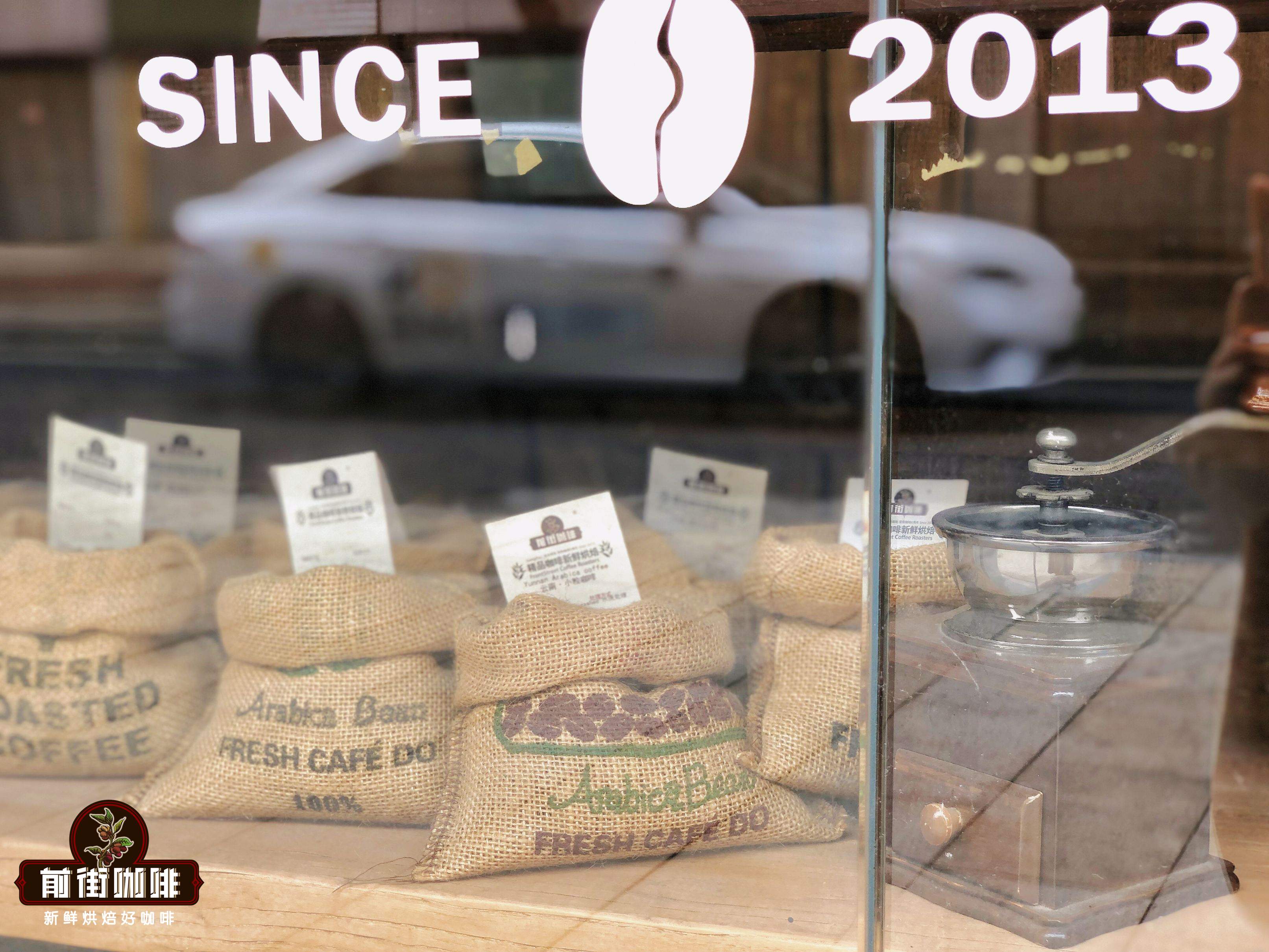
Both Front Street and many acid-loving coffee fans believe Kenya coffee is one of their favorites. Because Kenya coffee taste is exquisite, with excellent fruit flavor, sour and pleasant, for the front street, Kenya coffee is characterized by a very distinct fruit flavor. Kenyan coffee contains almost every flavor we want, so Front Street is obsessed with Kenyan coffee. To find out why Kenyan coffee is so fascinating, come on! Here are the answers you want.
As we all know, Ethiopia is recognized as the origin of coffee, Kenya and Ethiopia are neighbors, so Kenya's coffee development should be similar to Ethiopia. Contrary to popular belief, however, Kenya's coffee industry did not grow until after the 1960s.
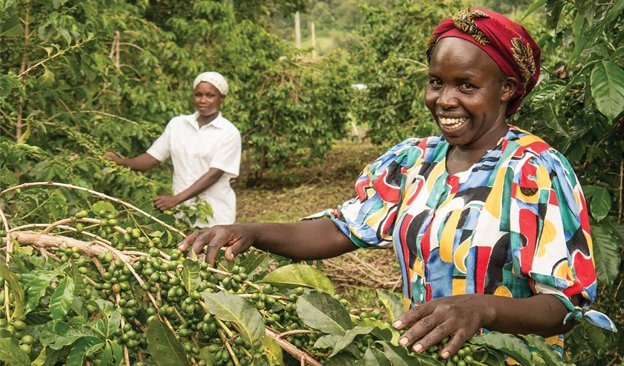
Front Street surfs the Internet to learn that Kenya's coffee was first introduced by missionaries from Brazil to bourbon. Initially planted in Taita Hills in Bura, coffee plants were seen in Kibwezi around 1900 and Kikuyu in 1904.
In addition, there is also a theory that the history of coffee cultivation in Kenya began around 1900 after the British colonists took over Kenya. In order to obtain coffee there, the British settled in Kenya and made a fortune by enslaving thousands of Kenyans to grow coffee. By the 1930s, farmers were growing in power, but even if they were numerous, they could not really own the right to use the land. To protect their own interests, the colonists forbade the natives to grow coffee and even deducted exorbitant rewards. The situation eased only in the 1960s when Britain relinquished control of Kenya. Despite bloodshed and slavery, Kenyan coffee thrives and is one of the best in the world.
Why Kenya Coffee Is So Sour
In addition to Kenya's favorable high altitude and varieties, there are also exquisite coffee processing techniques. Kenya's most important and unique coffee varieties are SL28/SL34. These two coffee varieties have pure Kenyan coffee pedigree, with rich berry and light red wine flavor, rich chocolate aftertaste, expert cup test and auction winners.
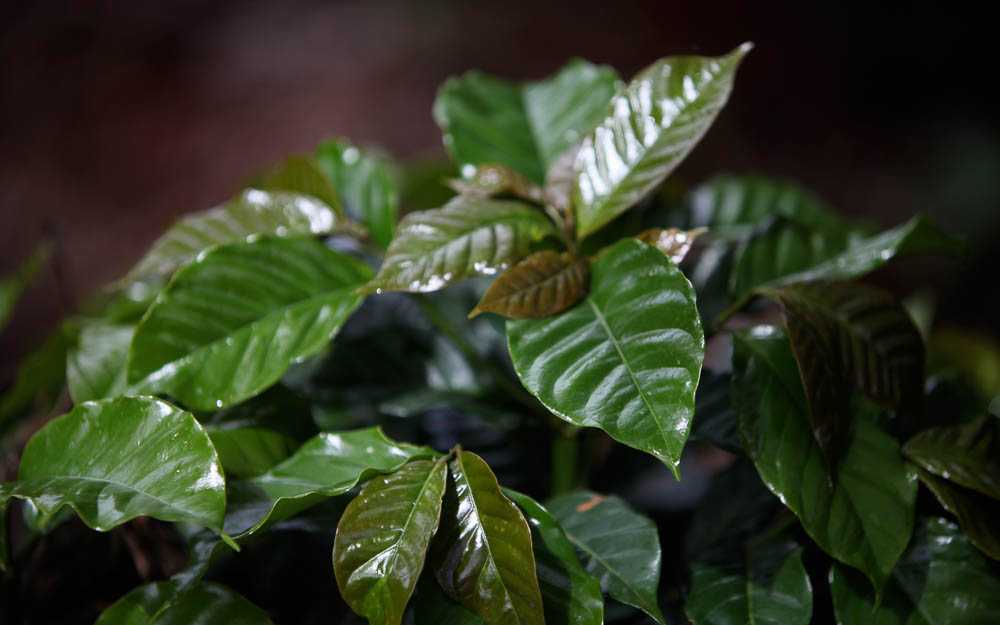
Although Kenya coffee variety SL28/SL34 has good flavor, its coffee yield and disease resistance are extremely poor. Therefore, in recent years, Kenya has planted Ruiru coffee beans with stronger disease resistance in a large area, while the pure SL28/SL34 coffee beans have been shrinking continuously. However, this new variety of coffee has not been favored by coffee lovers. Coffee lovers think that Ruiru coffee is sour but not fragrant, but its flavor is extremely vulgar. It is completely unable to compete with pure Kenya AA coffee that makes coffee lovers deeply amazed. Ruiru coffee, in particular, releases a rotten wood flavor when it cools, and the variety is not very productive, although it currently accounts for only 10% of Kenya's coffee.
Kenya coffee beans are basically treated by washing method, washing method is the most important treatment method of fine coffee beans, generally speaking, the coffee flavor after this treatment method is the purest, the least miscellaneous flavor, fruit and fruit flavor is also the best, in addition to this, more special treatment method is also "double washing method".
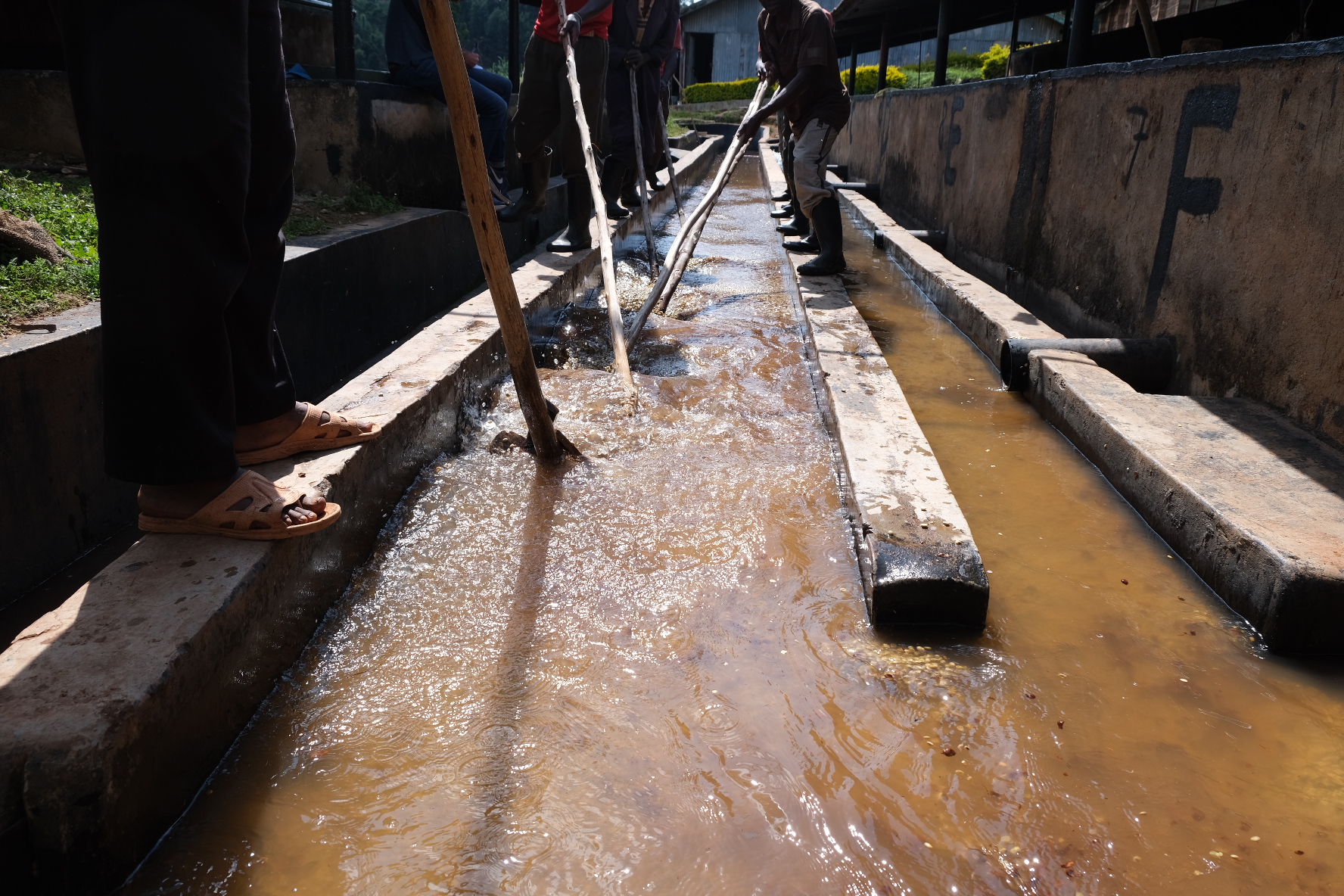
The so-called "double washing method" refers to the coffee beans are washed twice and fermented twice. Kenya double fermentation process flow: fresh fruit flotation → de-pulp → fermentation tank upper fermentation overnight → washing → shelled beans into the bottom fermentation tank to continue fermentation after 36 hours → washing → water for 12 hours → sunlight. The double fermentation method washing tank has two layers, high and low, which are used for the first and second washing respectively. Harvest coffee fruit, remove the defective fruit in the middle, remove the pericarp, pour into the upper fermentation tank for fermentation, or directly use the dry body not into the tank for fermentation. The time required for fermentation procedures is related to many factors, the hotter the environment, the faster the fermentation, but after a period of fermentation, washing to remove most of the pectin, and then put in the lower net pool, for secondary fermentation, it is worth noting that during fermentation every few hours need to change the circulating water, in case coffee beans stink.
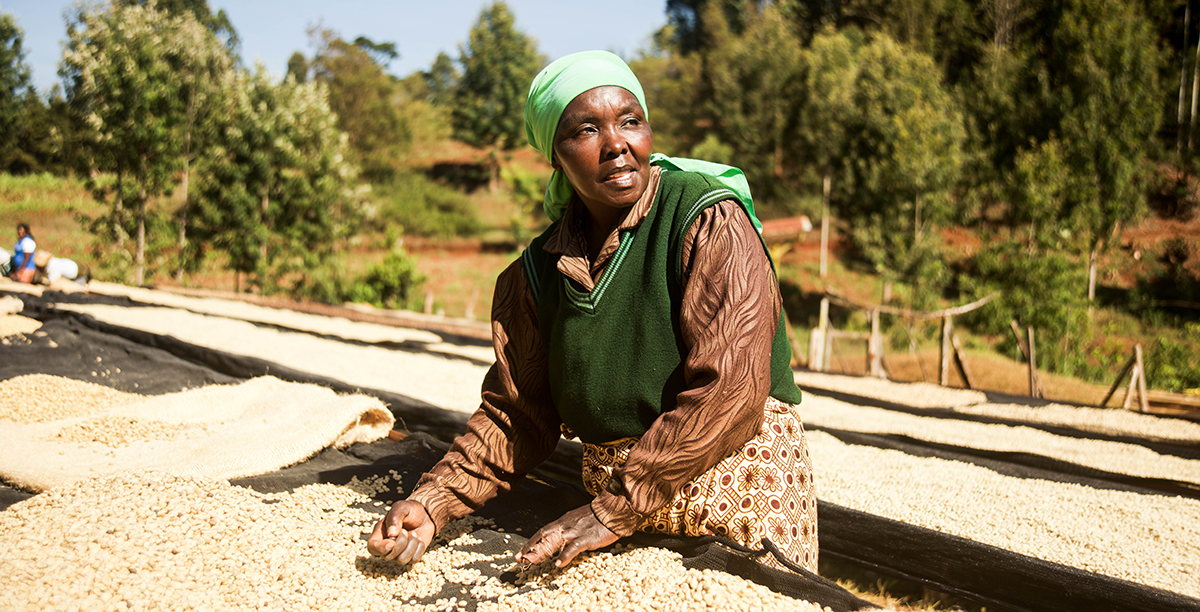
Washing the coffee beans again with water to remove residual pectin, secondary fermentation and washing, it takes 36 hours, but this is not over yet. If the coffee beans are soaked in fermentation for too long, the negative flavor will increase. Once it exceeds 36-72 hours, excessive fermentation may occur and fatty acids will be produced, resulting in too sour taste of coffee. Therefore, this process takes about 12 hours or more. That is to say, washing in Kenya takes at least 48 hours. Even up to 72 hours. Kenya's unique double-fermentation washing process improves the original acidity and cleanliness because the washing process increases the acetic acid concentration of the coffee beans during fermentation and thus enhances the coffee flavor. Kenya coffee's impressive clean and exciting flavor is due to the coffee process in addition to the cultivation environment of the coffee beans themselves.
Kenya AA Coffee Features
In Xu Baolin's book Bean Seeker, eight grades are mentioned in the classification of Kenyan coffee beans: E, AA, AB, PB, C, TT and M. Among them, Kenya AA is a word that friends often see when looking for Kenya coffee beans in front street stores.
Kenya AA standards are that coffee beans are 17 and 18 mesh (7.2mm--8.2mm) in particle size and are all flat beans (each coffee cherry contains two beans).
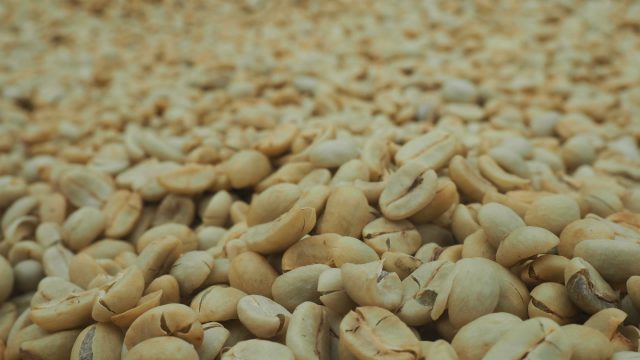
Many friends who have just come into contact with Kenyan coffee will ask after getting a packet of Kenyan coffee beans in the front street, how to drink Kenyan coffee better? The baristas in the front street would recommend hand brewing. If you want it sour, choose hot hand brewing. If you want it more refreshing, choose ice hand brewing, cold foam, ice drops.
Brewing advice
If there are no conditions for making iced coffee, how can Kenya coffee be brewed? Next, Qianjie will take hot hand rush as an example to explain the parameters to you.
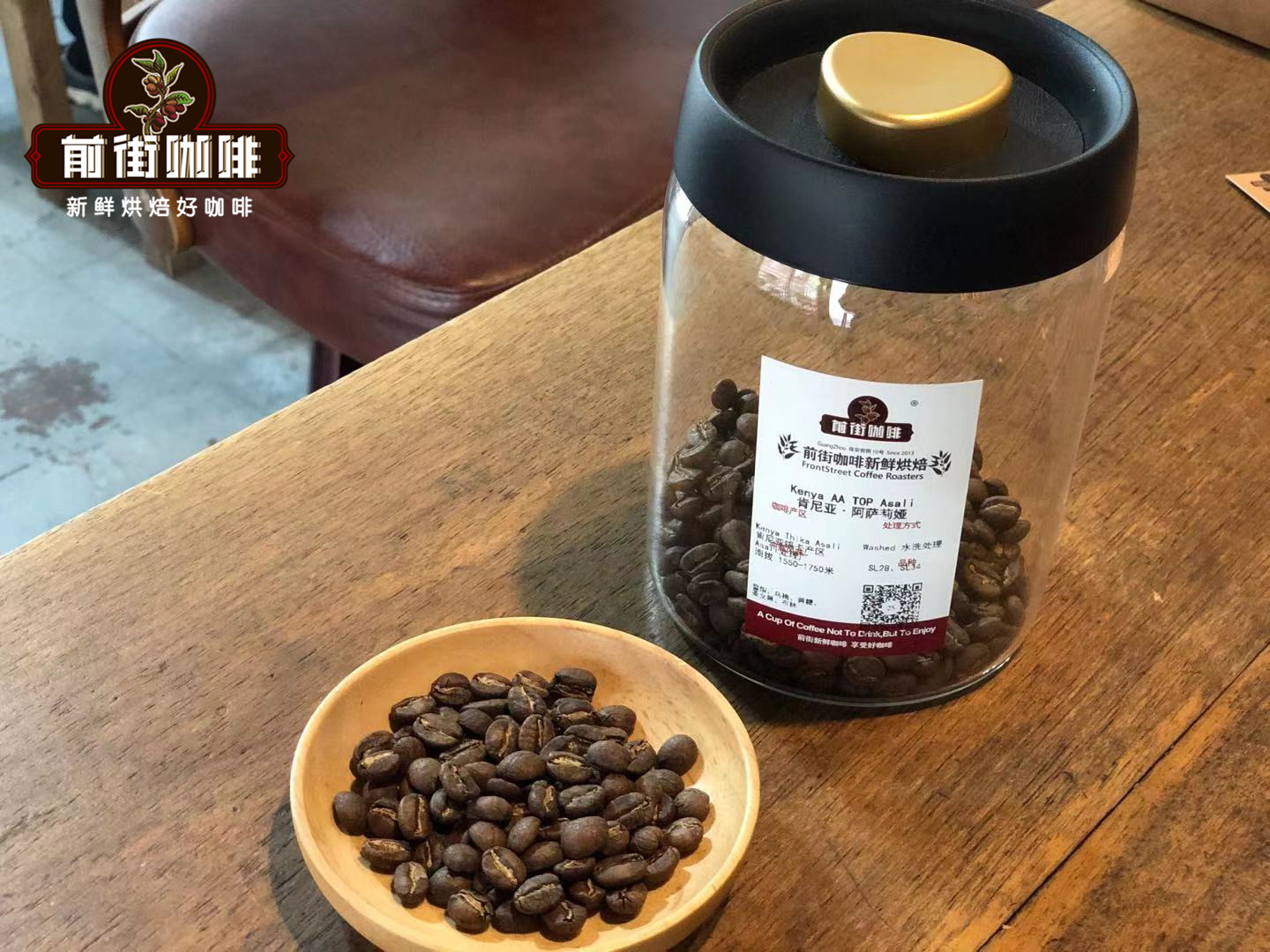
[Front Street Coffee Kenya Asalia Coffee]
Production area: Thika, Kenya
Treatment plant: Asali Honey Treatment Plant
Altitude: 1550-1750 m
Rating: AA TOP
Varieties: SL28, SL34
Treatment: Kenya 72 hour wash
Brewing suggestion: Filter cup: Hario V60 Water temperature: 90-91℃ Powder amount: 15 g Powder water ratio: 1:15 Grinding degree: EK43s#10
Steaming with 30g water for 30s, injecting water in a circle to 125g, stopping injecting water to 225g when the water level drops, removing the filter cup when the water level drops to expose the powder bed, and extracting for 200 ".
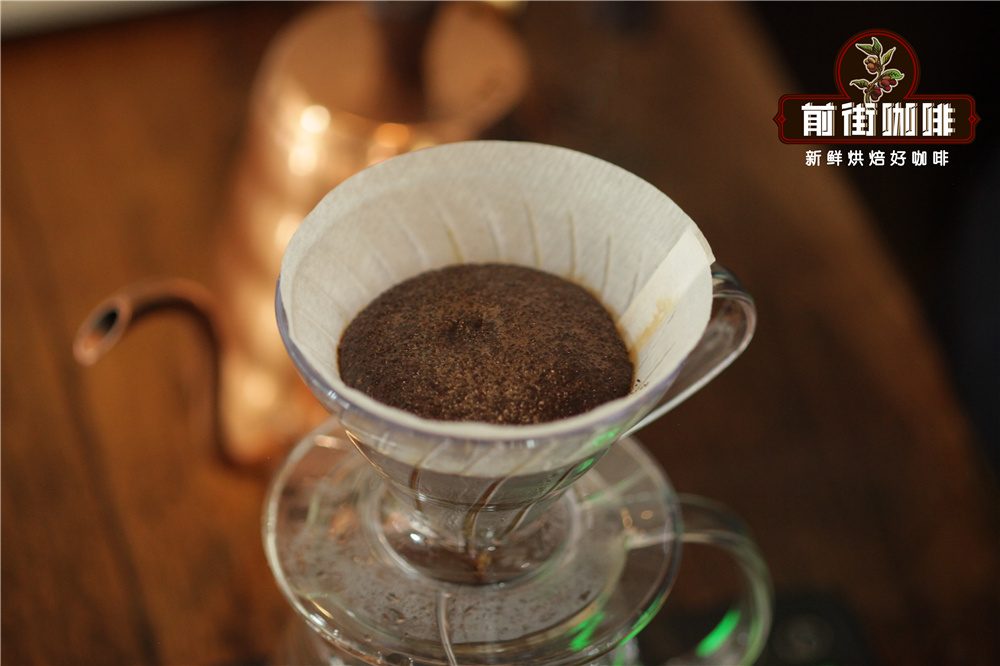
Flavor Description: Wet aromas with ripe tomato and floral, cherry and plum flavors on the palate, bright acidity, clean and the most solid and rich taste, like the weight of African elephants! The middle part is sweet, juicy, fruity and sweet with raspberry aftertaste and green tea aroma.
For more coffee bean information, please pay attention to coffee workshop (Weixin Official Accounts cafe_style) professional coffee knowledge exchange, please add micro signal kaixinguoguo0925
Important Notice :
前街咖啡 FrontStreet Coffee has moved to new addredd:
FrontStreet Coffee Address: 315,Donghua East Road,GuangZhou
Tel:020 38364473
- Prev
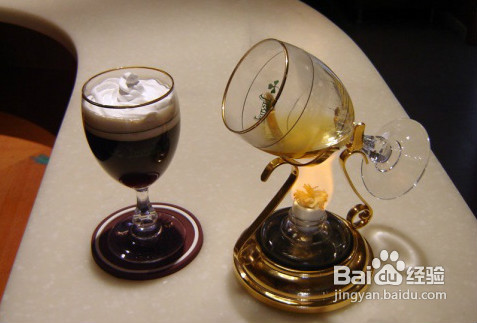
Introduction of Kaha Yang Ganzhuang Garden in the production area of Jinta Mani, Bali Coffee, Indonesia
Bali coffee, known as aristocratic coffee, is the most classic of French coffee culture. It is very popular both in France and in Europe and around the world. In particular, it is permeated with a strong aristocratic culture, and it is a favorite of coffee lovers. The French court is the center of French political and cultural life, and the salon of upper-class society has always led the mass culture and life of France.
- Next
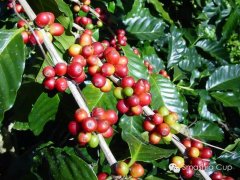
Robusta Coffee in Espresso mixed Coffee Fancy Coffee Italian mixed Coffee beans
Application of Robusta Coffee in Espresso blended Coffee many friends think that as long as there is Robusta in Espresso blended coffee, it must be a bad thing. Is that really the case? So is 100% Arabica coffee definitely better in taste than Espresso, which uses Robusta coffee? The answer to this question is of different opinions.
Related
- Detailed explanation of Jadeite planting Land in Panamanian Jadeite Manor introduction to the grading system of Jadeite competitive bidding, Red bid, Green bid and Rose Summer
- Story of Coffee planting in Brenka region of Costa Rica Stonehenge Manor anaerobic heavy honey treatment of flavor mouth
- What's on the barrel of Blue Mountain Coffee beans?
- Can American coffee also pull flowers? How to use hot American style to pull out a good-looking pattern?
- Can you make a cold extract with coffee beans? What is the right proportion for cold-extracted coffee formula?
- Indonesian PWN Gold Mandrine Coffee Origin Features Flavor How to Chong? Mandolin coffee is American.
- A brief introduction to the flavor characteristics of Brazilian yellow bourbon coffee beans
- What is the effect of different water quality on the flavor of cold-extracted coffee? What kind of water is best for brewing coffee?
- Why do you think of Rose Summer whenever you mention Panamanian coffee?
- Introduction to the characteristics of authentic blue mountain coffee bean producing areas? What is the CIB Coffee Authority in Jamaica?

